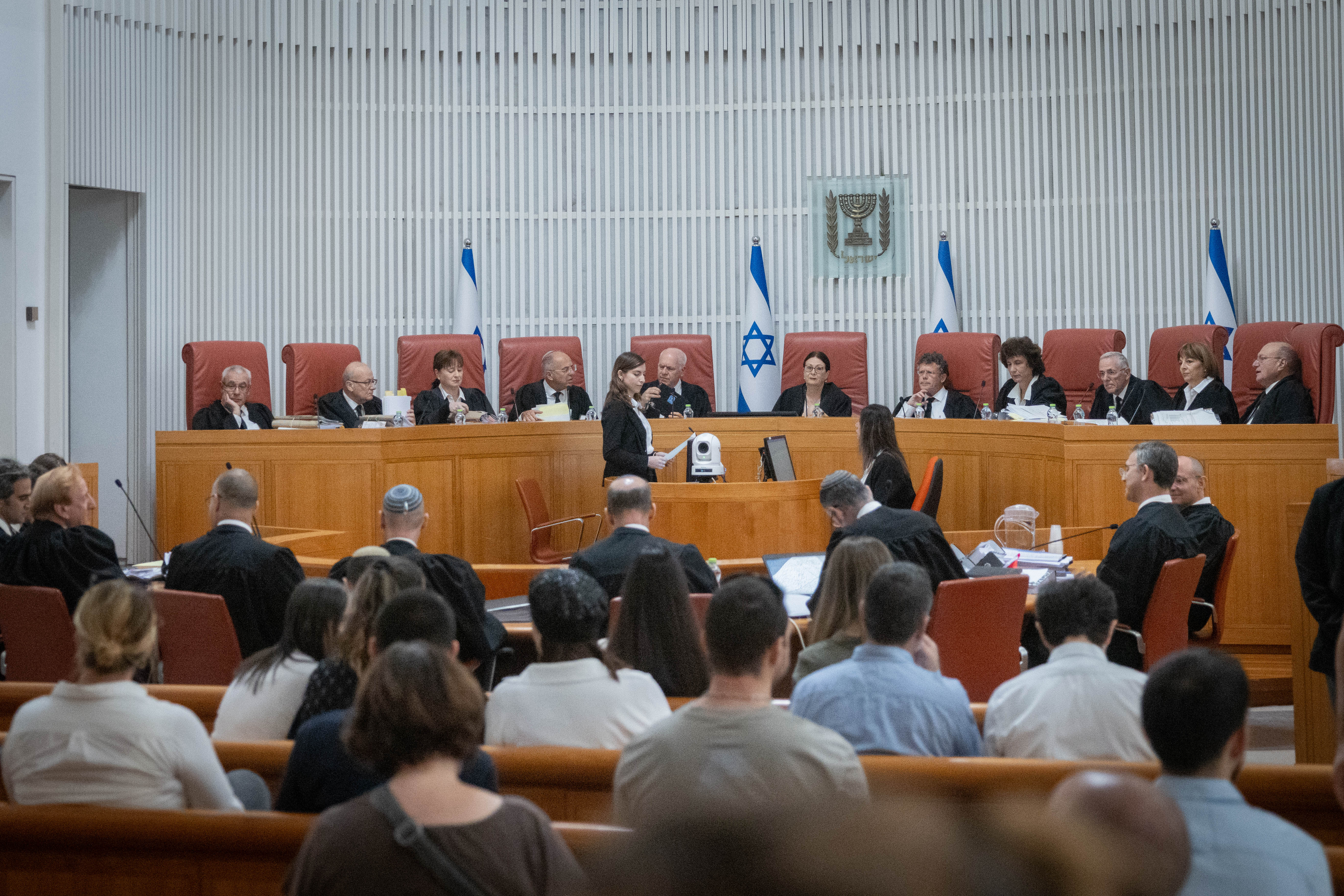The Supreme Court Ruling on Canceling the Reasonableness Clause—Implications
Explainer
The Supreme Court ruled that the Court has authority to perform judicial review on Basic Laws, and that an intervention was necessary in the case of the amendment to the Basic Law: The Judiciary revoking the Standard of Reasonableness. What are the implications?

Photo by Chaim Goldberg/Flash90
Regarding the authority of the Supreme Court to perform judicial review on the content of a basic law: Twelve justices out of fifteen ruled that the Court has such a right in principle and that it may intervene in exceptional and extreme cases in which the Knesset has exceeded its constitutive powers. The justices’ opinions cited the special constitutional structure in Israel and the relative ease with which basic laws can be amended, and some of them referred to the Declaration of Independence. This decision was passed by a majority of twelve to two (Justice Elron’s view also leaves a very narrow door open for future discussion of Supreme Court intervention in basic laws).
Regarding the question of whether there is a basis for the Court to intervene regarding the content of this specific amendment to the Basic Law: The Judiciary, which revokes the extreme unreasonableness doctrine for reviewing decisions taken by the government and its ministers, the majority of the Court ruled that such intervention is indeed necessary. This is due to the severe and unprecedented harm the amendment would case to the core characteristics of the State of Israel as a democratic state, particularly regarding the separation of powers and the rule of law. This decision was passed by a majority of eight to seven.
: Justices Sohlberg and Mintz ruled that the Supreme Court does not have the right to apply judicial review to the content of a basic law. Justice Elron disagreed with the majority opinion, but left the door open for intervention in highly exceptional cases. Justices Willner, Kanfi-Stienitz and Stein ruled that in their opinion, the amendment should be interpreted in a narrow sense such that the extreme unreasonableness doctrine could still be applied to “baseless” decisions. Justice Kasher strongly criticized the amendment, but was not of the opinion that this justifies striking it down (though he does hold that the Court has the power to do so in extreme cases).
The amendment to the Basic Law: The Judiciary is now revoked, and the extreme unreasonableness doctrine is now restored to Israeli law, with the same application it had before the amendment was passed. The ruling has a substantive and immediate consequence, as there are ongoing cases in which arguments have been put forward about the unreasonableness of government decisions and in which proceedings were suspended until the ruling on this case was handed down. Those cases will now move forward again.
The ruling constitutes a historical precedent, and the Court has sent a clear message to the current government and to all coalitionary majorities in the Knesset, as follows:
- Restricting the constitutive powers of the Knesset. The power to pass basic laws is not unbounded. This was the opinion of an overwhelming majority of the Court (twelve justices out of fifteen). The fact that the Knesset calls a law a “basic law” and passes it with a majority does not make it entirely immune from judicial review. Though the Supreme Court has ruled in the past that it is empowered to determine whether the Knesset has misused its constitutive powers when passing a basic law, it has never before struck down basic law legislation. This ruling marks the first time that the Court has ruled that it has the authourity to review the Knesset’s use of its constitutive powers with regard to the content of a basic law—in the rare cases in which a basic law negates or critically harms the core identity of the State of Israel as a Jewish and democratic state. If the Court had not given this ruling, the Knesset would essentially be entitled to pass any law—including, for example, a law withdrawing the right to vote from certain publics—as long as its title includes the words “basic law” and it is passed by a majority of 61 Knesset members. The Supreme Court, then, has set boundaries for the Knesset’s constitutive powers.
- The Court set a clear boundary to the government. The Supreme Court ruled that the extreme unreasonableness doctrine is a critical doctrine in the State of Israel, which has considerable weaknesses relative to other countries in terms of its checks and balances. Revoking this doctrine would do critical harm to the rule of law and the separation of powers in Israel, as well as to the protection of the gatekeepers of these principles (in terms of civil service appointments), to the extent that it would strike at the very heart of Israel’s democratic identity.
- First, and most obviously, the government must respect and uphold the ruling. Respecting court rulings should go without saying in a democratic country in which the rule of law holds sway. This has always been the case in the State of Israel.
- The Knesset may pass a different, more moderate version of the amendment regarding the reasonableness doctrine. During public debate of this issue, various more moderate versions were put forward which could have been passed with a larger Knesset majority. The Knesset is of course entitled to formulate legislation that is substantively different from the amendment that was struck down by the Supreme Court.
